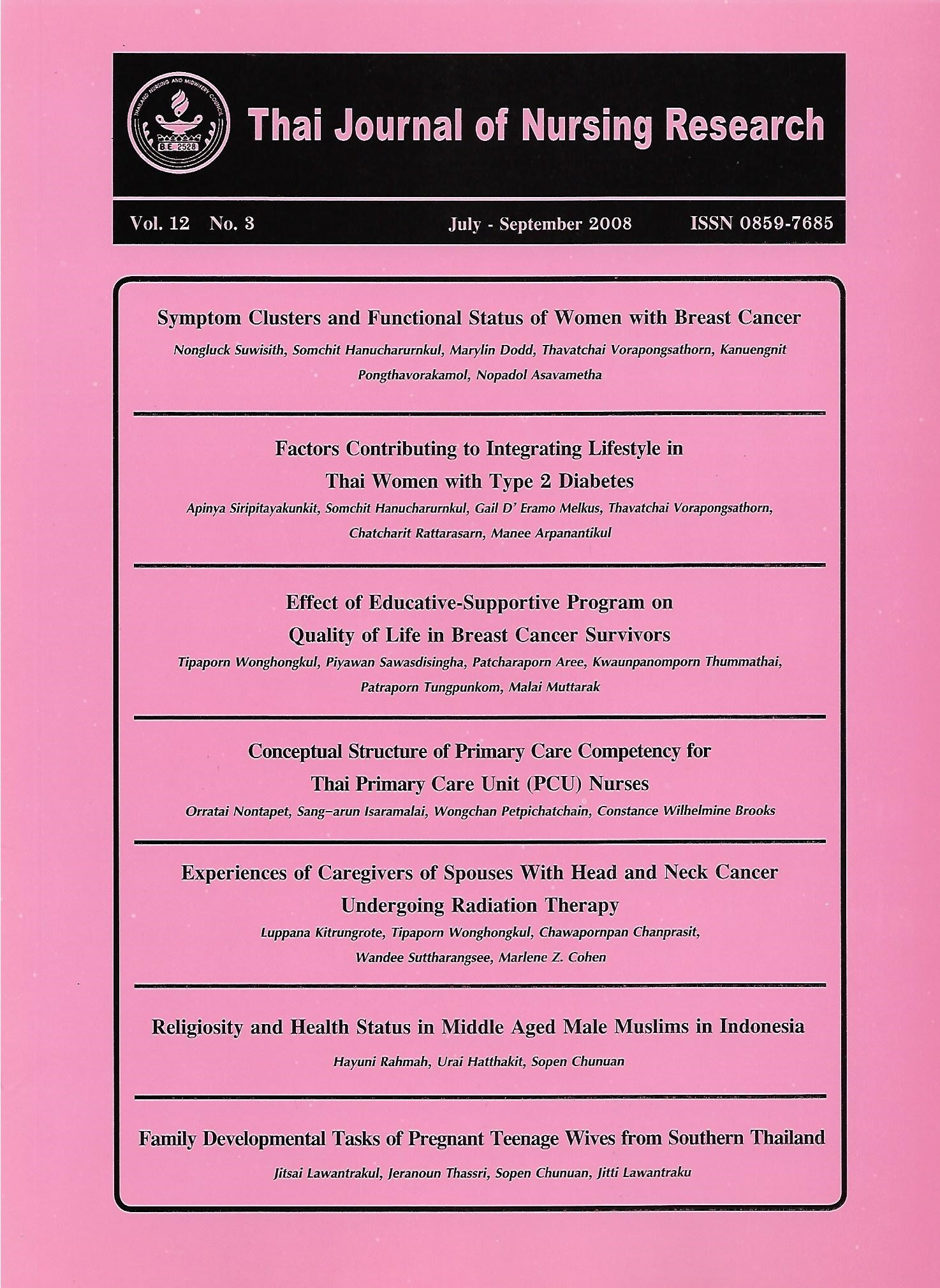Effect of Educative-Supportive Program on Quality of Life in Breast Cancer Survivors
Keywords:
โปรแกรมการสนับสนุนและให้ความรู้, คุณภาพชีวิต, ผู้รอดชีวิตจากมะเร็งเต้านมAbstract
บทคัดย่อ
ผู้รอดชีวิตจากมะเร็งเต้านมต้องเผชิญกับผลกระทบระยะยาวจากโรคและการรักษาซึ่งกระทบ ต่อคุณภาพชีวิต การวิจัยกึ่งทดลอง (quasi experimental design) ครั้งนี้มีวัตถุประสงค์เพื่อศึกษาผลของโปรแกรมการสนับสนุนและให้ความรู้ต่อคุณภาพชีวิตของผู้รอดชีวิตจากมะเร็งเต้านมที่ได้รับการวินิจฉัยนาน 5 ปีขึ้นไป จำนวน 61 ราย ที่มารับการรักษาที่โรงพยาบาลมหาราชนครเชียงใหม่ คณะแพทยศาสตร์ มหาวิทยาลัยเชียงใหม่ คัดเลือกกลุ่มตัวอย่างตามเกณฑ์ กลุ่มควบคุมและกลุ่มทดลอง ถูกทำให้มีความคล้ายคลึงกันก่อนแบ่งเข้ากลุ่มเป็นกลุ่มควบคุม 31 คน และกลุ่มทดลอง 30 คนโดยวิธีจับคู่ด้วย อายุ ระดับการศึกษา และจำนวนปีที่รอดชีวิต เครื่องมือที่ใช้ดำเนินการวิจัย คือโปรแกรมการสนับสนุนและให้ความรู้ซึ่งถูกจัดกระทำ 4 ครั้ง นานครั้งละ 4 ชั่วโมง แต่ละครั้งจัดห่างกัน 2 สัปดาห์ เครื่องมือที่ใช้ในการรวบรวมข้อมูล ได้แก่ แบบสอบถามข้อมูลส่วนบุคคลและข้อมูลทางสุขภาพ แบบสอบถามคุณภาพชีวิตในผู้ป่วยมะเร็งเต้านม และแบบสอบถามการจัดการตนเอง แบบสอบถามทั้งหมดจะถูกตอบโดยกลุ่มตัวอย่าง เก็บรวบรวมข้อมูล 3 ครั้ง คือ ก่อนเข้าโปรแกรม สิ้นสุดโปรแกรม และอีก 3 เดือนหลังสิ้นสุดโปรแกรม ผลการวิจัยพบว่ากลุ่มทดลองมีคะแนนเฉลี่ยคุณภาพชีวิตใน 3 ระยะ คือ 6.43 (SD=1.21) 6.30 (SD=1.18) และ 5.86 (SD=1.39) ตามลำดับ ส่วนกลุ่มควบคุมมีคะแนนเฉลี่ยคุณภาพชีวิตแต่ละระยะคือ 5.82 (SD=1.22) 5.51 (SD=1.09) และ 5.41 (SD=1.14) ตามลำดับ ทดสอบความแตกต่างของคะแนนเฉลี่ยคุณภาพชีวิตทั้ง 3 ระยะระหว่างกลุ่มควบคุมและกลุ่มทดลองด้วย สถิติ Repeated measure ANOVA พบว่าไม่มีอิทธิพลร่วมระหว่างชนิดของการทดลองและระยะเวลา (F Wilk’s Lamba = .763, p=.471) และยังพบความแตกต่างค่าเฉลี่ยของคุณภาพชีวิตระหว่างกลุ่ม (F =5.313, p= .025) และภายในกลุ่ม(F =6.682, p= .002) จากนั้นทดสอบความแตกต่างระหว่างคู่ด้วยสถิติ Bonferroni ผลพบว่ามีความแตกต่างอย่างมีนัยสำคัญทางสถิติของคะแนนเฉลี่ยคุณภาพชีวิตระยะ 1 กับ ระยะ 3 ในกลุ่มทดลอง แม้ว่าผลการวิจัยจะไม่ได้แสดงให้เห็นความแตกต่างทางสถิติของคุณภาพชีวิตระหว่างกลุ่มทดลองและกลุ่มควบคุม แต่พบว่าในกลุ่มทดลองมีการเพิ่มขึ้นของกิจกรรมการดูแลตนเองซึ่งเป็นตัวแปรที่นำไปสู่คุณภาพชีวิต ดังนั้นควรมีการพัฒนาโปรแกรมสนับสนุนและให้ความรู้ในผู้รอดชีวิตจากมะเร็งเต้านมต่อไปเนื่องจากเป็นกลยุทธ์ที่จำเป็นต่อการเพิ่มคุณภาพชีวิต
คำสำคัญ: โปรแกรมการสนับสนุนและให้ความรู้ คุณภาพชีวิต ผู้รอดชีวิตจากมะเร็งเต้านม
Abstract
Breast cancer survivors experience long-term problems related to their disease and treatment, and this can decrease their quality of life. This quasi-experimental research aimed to study the effect of an Educative-Supportive Program on quality of life among 61 breast cancer survivors diagnosed for at least 5 years, at Maharaj Nakorn Chiang Mai hospital, Thailand. Eligible participants were obtained by using purposive sampling and matching of age, education, and year of survival was conducted before group assignment. Participants were assigned into the control and the experimental group, 31 in the control and 30 in the experimental. Implementation of the Educative-Supportive Program was separated into 4-hour sessions, conducted 4 times continuously with 2 weeks interval. Participants’ self-report instruments included, Demographic Data Form, Quality of Life: Breast Cancer Version Questionnaire and Self-management Questionnaire. Data were collected 3 times: before the program began (time 1), after the program (time 2) and 3 months after the program ended (time 3). The results showed that mean score of quality of life in the experimental group for all 3 times were 6.43 (SD=1.21), 6.30 (SD=1.18) and 5.86 (SD=1.39), respectively while those in control group were 5.82 (SD=1.22), 5.51 (SD=1.09) and 5.41 (SD=1.14), respectively. By using repeated measure ANOVA, the results indicated no interaction between treatment effect and time effect (F Wilk’s Lamba = .763, p=.471). Moreover, a significance differences in quality of life mean score between groups (F =5.313, p= .025) and within groups (F =6.682, p= .002) were shown. Using Bonferroni criterions, the results revealed a significance difference of quality of life score between time 1 and time 3 in the experimental group (mean difference = .491, p=.001). Although the results were not as expected, the evidence of intermediate outcome-self care activities in the experimental group was shown. Further development of Educative-Supportive Programs among Thai breast cancer survivors is still needed, as it is an essential strategy to increase quality of life.
Keywords: educative-supportive program, quality of life, breast cancer survivors
Downloads
How to Cite
Issue
Section
License
Copyright: The Pacific Rim International Journal of Nursing Research, Thailand Nursing & Midwifery Council has exclusive rights to publish, reproduce and distribute the manuscript and all contents therein.








.png)



